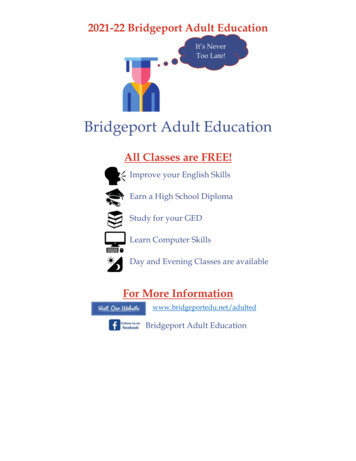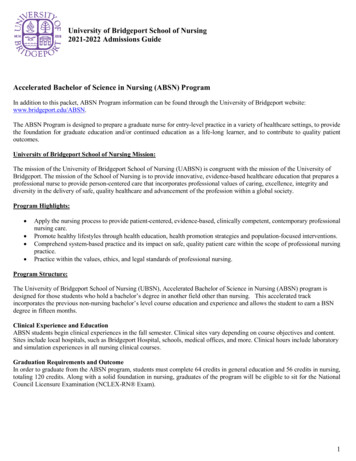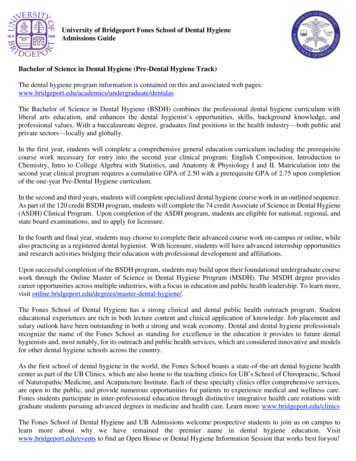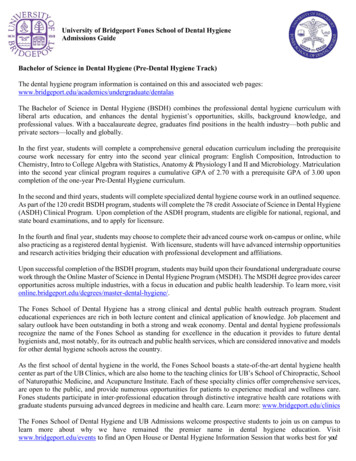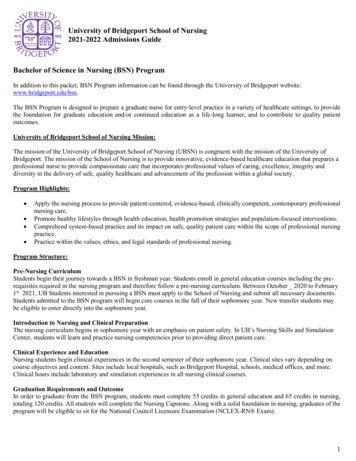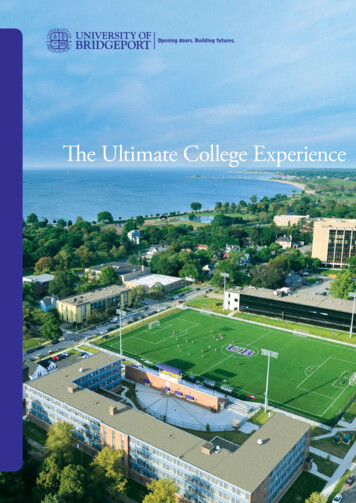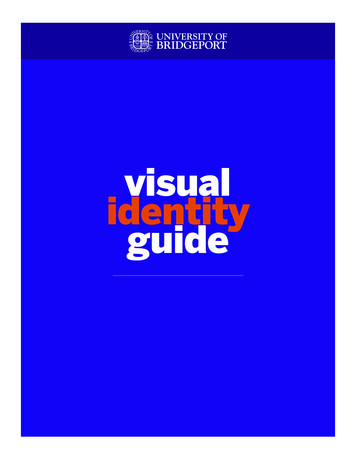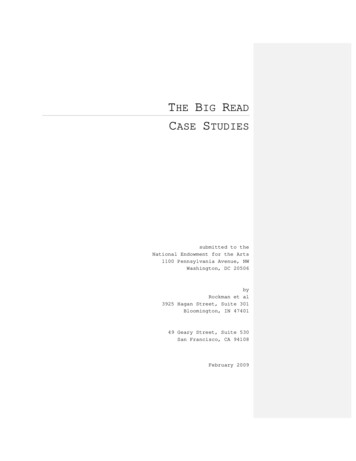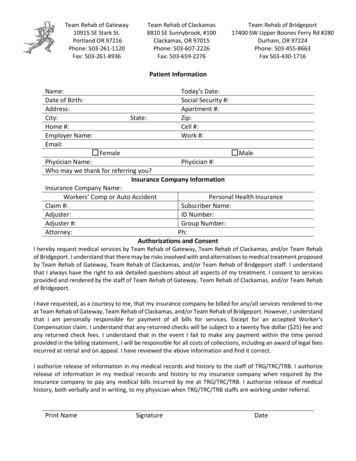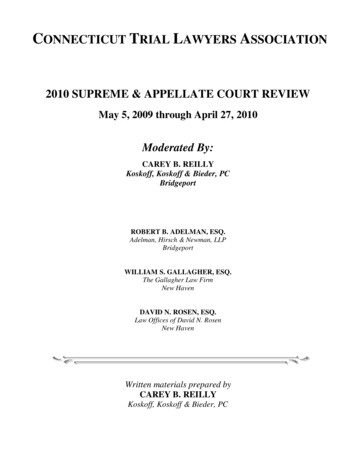
Transcription
UNIVERSITY OF BRIDGEPORTSchool of EngineeringFALL 2015COURSE OUTLINETCMG 574-9T1Principles of LogisticsInstructor:Course Number:Credit Hours:Office Hours:Elif KongarOffice:141 TECHTCMG 574E-mail:kongar@bridgeport.edu3Phone:(203) 576-4379Tuesday: 1:00 PM – 3:00 PMThursday: 3:00 PM – 5:00 PM [Other times by appointment]Course Description:This course covers design and operation of logistics systems and integrated supply chains, andpresents materials management, logistics theory and concepts in today’s manufacturing andcommercial environments. It presents materials management, logistics theory and concepts intoday’s manufacturing and commercial environments. Mathematical programming and operationsresearch tools and techniques useful for efficient distribution of goods and products areexplained.Course Prerequisites:Basic knowledge of management concepts.General spreadsheet skills and familiarity with computer science and engineering topics.Course Objectives:The students will learn in depth knowledge regarding logistics and materials management.The students will gain comprehensive knowledge on business practice and problem solvingin logistics and logistics related areas.The students will have an opportunity to develop a research, execute the research, analyzeand evaluate the results and communicate these results to an audience.Course Topics:Introduction to basic concepts of logistics managementDefinition - Logistics role in the economy and in the firmOrganization of Logistics functionsIntegrating Logistics functions in overall organization structureMeasurement of performance of Logistics function and functionariesMeasurement of improvement of Logistics services - quality and performanceSupply Management and Logistics - Integrated Logistics Planning - Evolution of World ClassManagement and implication for supply ManagementOutsourcingLogistics Management problemsImproving Inventory Management - ABC analysis, Forecasting Inventory Model order,processing systems, re-order level TQM/JITERP / MRPReverse logistics / Concept – Uncertainty in reverse logistics TCMG – Principles of LogisticsKongar, 2015
Schedule and Classroom:Tuesday9:00AM – 12:00PMMandeville Hall, Room 218 (MAN 218)Examinations and Grading Criteria:Assignments:Midterm exam:Final Exam/Project:30%35%35%- Announced throughout the semester- To be explained in detail during the courseAttendance / Canvas utilization will be considered as a part of the final exam grade.Bonus points will be credited throughout the course.The grading is subject to change and the changes will be communicated with the students.Textbook:1. Contemporary Logistics, 10/E by Paul R. Murphy, Jr. and Donald Wood, ISBN-10:0136110770, ISBN-13: 9780136110774, Prentice Hall, 2010.2. Additional handouts may be providing during the semester.Recommended (Optional) Reading:1. "Supply Chain Management: Strategy, Planning and Operation", 5th edition, by Chopra andMeindl, Prentice Hall, 2012. ISBN-10: 0132743957 ISBN-13: 978-01327439522. Operations Research: An Introduction by Taha, ISBN: 0130323748.3. An Introduction to Management Science by Anderson, Sweeney and Williams. ISBN: 0-31479321-6.Software:General spreadsheet applications and other course related software (such as LINGO) will/may beused throughout the semester. Blackboard usage is essential for the successful completion of thecourse.Policies:Late homework / project assignment submission will not be accepted.Three or more unexcused absences will result in an automatic failure.Make-up exams / quizzes will not be allowed (except for prior instructor approval for adocumented emergency)Homework assignments and programs are due within a week from the assignment date,unless the instructor notes otherwise.All homework assignments are to be typed.Programs are to be submitted with all I/O files and source code hardcopies.Extra credit quizzes, assignments, and programs (if any) will be announced by the instructor.It is the student's responsibility to familiarize himself or herself with and adhere to thestandards set forth in the policies on cheating and plagiarism as defined in Chapters 2and 5 of the Key to UB http://www.bridgeport.edu/pages/2623.asp or the appropriategraduate program handbook.As a UB policy, it is expected that each student that attends one hour of classroominstruction will require a minimum of two hours of out of class student work each weekfor approximately fifteen weeks for one semester. TCMG – Principles of LogisticsKongar, 2015
Assignment Submission Guidelines1. Computer-type your assignments (preferably MS-Word format).2. Save your file with a proper filename format:e.g: If the student name is Elif Kongar, student ID# 0123456, Homework Assignment 1;the filename should be:TCMG574 Elif Kongar 0123456 HW1.3. Login to myub and click on the Canvas link under Library & Technology Resources. Use thefirst part of your UB email as username (for example: jbond, without the @bridgeport.edu) andfollow the instructions to set up your password.4. Sign in to your UB Canvas account and then into the course, e.g. “Statistical Quality ControlTechniques” to submit your assignments.To access Canvas tutorial for /900843UB Canvas account can also be accessed through the ant DatesClasses BeginMidterm ExamFinal ExamLast Day of ClassesFinal Grades DueMonday, 8/24Tuesday, 10/20Tuesday, 12/01Friday, 12/5Monday, 12/14Grading scale TCMG –Letter GradePercentageAAB BBC CCD DDF94.9 – 100%90 – 94.8%87 – 89.9%83 – 86.9%80 – 82.9%77 – 79.9%73 – 76.9%70 – 72.9%67 – 69.9%63 – 66.9%60 – 62.9%Below 60% Principles of LogisticsKongar, 2015
Weekly SchedulePlease note that the class notes and Handouts are usually updated weeklyWeek18/2529/139/8 TCMG –Topic SyllabusIntroduction to the Class Supply Chain Review: Basic Definitions and TerminologyAn Overview of LogisticsEconomic Impacts of LogisticsMacroeconomic ImpactsEconomic UtilityLogistics DefinitionThe Increased Importance of LogisticsA Reduction in Economic RegulationChanges in Consumer BehaviorTechnological AdvancesThe Growing Power of RetailersGlobalization of TradeThe Systems and Total Cost Approaches to LogisticsLogistical Relationships within the Firmo Financeo Productiono MarketingChannel Intermediaries/ FacilitatorsResponsibilities of Logistics ManagersLogistics Careers Assignment 1 Logistics and Information TechnologyApplication specific softwareDataData miningData warehouseElectronic data interchange (EDI)Enterprise resource planning (ERP) systemGlobal positioning systems (GPS)InformationLogistics information system (LIS)On-demand software (software-as-a-service)Radio-frequency identification (RFID)Reverse auctionTransportation Management System (TMS)Warehouse Management System (WMS)Wireless communicationGeneral Types of Information Management SystemsDecision Support Systems (DSS)Logistical Functions and Activities Principles of LogisticsKongar, 2015
4 TransportationWarehousingMaterials handlingOrder managementEquipment and MaterialsBar codingWMSsThe Internet’s Influence on LogisticsOnline RetailingIn-store RetailingInformation Technology ChallengesAdditional Sources/VideosAssignment 1 is dueAssignment 2 Strategic and Financial LogisticsConnecting Strategy to Financial Performanceo Cost leadership strategyo Differentiation strategyo Focus strategyBasic Financial TerminologyIncome statementBalance sheetStrategic Profit ModelReturn On Investment (ROI)Return On Net Worth (RONW)Return On Assets (ROA)Logistics Connections to Net Profit MarginLogistics Connections to Asset TurnoverBalanced ScorecardCommon Logistics MeasuresAssignment 2 Faculty Development Day – No ClassAssignment 2 is due Organizational and Managerial Issues in LogisticsOrganizing Logistics within the Firmo Organizational structureo Organizational designo Centralized logistics organizationo Decentralized logistics organizationOrganizational Design for Logisticso Hierarchical (functional)o Matrixo NetworkManagerial Issues in LogisticsProductivityWorker ProductivityAsset ProductivityTheft and Pilferage9/1559/2269/29 TCMG – Principles of LogisticsKongar, 2015
7 Logistics Social ResponsibilityManaging Reverse LogisticsAssignment 3 Inventory ManagementInventory costso Carrying costso Ordering costso Stockout costsInventory ClassificationsDetermination of Safety Stock LevelFixed order quantity systemFixed order interval systemReorder (trigger) point (ROP)Economic order quantity (EOQ) in dollarsInventory FlowsInventory Management: Special ConcernsLean ManufacturingService Parts LogisticsVendor-Managed Inventory (VMI)Assignment 3 is due10/6 810/13910/201010/271111/31211/10 TCMG – Distribution Center, Warehouse, and Plant LocationThe Strategic Importance of Facility LocationGeneral Factors Influencing Facility LocationNatural ResourcesPopulation Characteristics—Market for GoodsPopulation Characteristics—LaborGeneral Factors Influencing Facility LocationFinding the Lowest-Cost LocationCenter-of-gravity approacho Center-of-Gravity Exampleo Weighted Center-of-Gravity ExampleFacility Relocation and Facility ClosingClass/Midterm Review Midterm Exam Midterm Exam SolutionsTransportation/Distribution ProblemsCase Study: P&T CompanyMathematical Model and Solution for P&T Transportation ProblemTransportation Problem ExampleSpreadsheet Solution of the Transportation Problem ExampleAssignment 4 Assignment 4 is due TransportationAirMotor carrier (truck) Principles of LogisticsKongar, 2015
PipelineRailWaterOverview of Transportation InfrastructureTransportation ModesIntermodal TransportationContainersTransportation SpecialistsFreight forwardersAir forwardersShipper’s associationsBrokers3PLsParcel carriersFederal Regulation of Transportation in U.S. International LogisticsInternational Supply ChainFuture of LogisticsCourse Review - Final Project Discussion14 Last Day of Classes – Final Project Due11/2415 Last Day of Classes – Final Project Due1311/1712/1 TCMG – Principles of LogisticsKongar, 2015
TCMG - Principles of Logistics Kongar, 2015 UNIVERSITY OF BRIDGEPORT School of Engineering FALL 2015 COURSE OUTLINE TCMG 574-9T1 Principles of Logistics Instructor: Elif Kongar Office: 141 TECH Course Number: TCMG 574 E-mail: kongar@bridgeport.edu Credit Hours: 3 Phone: (203) 576-4379
